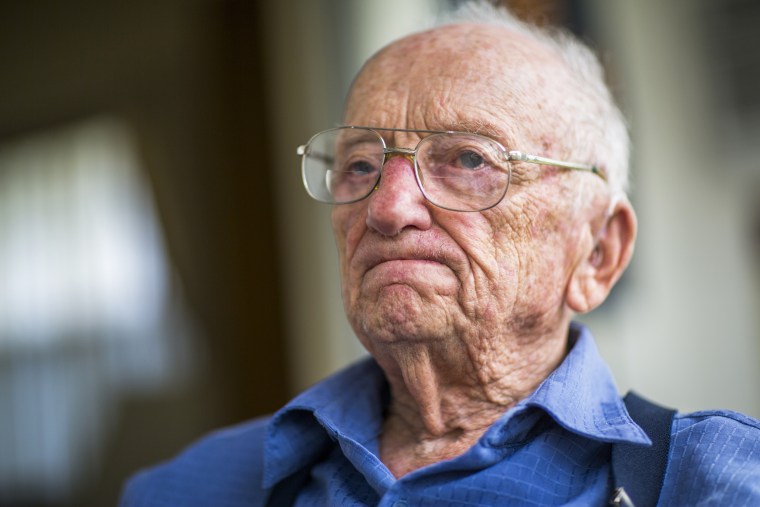Ben Ferencz, the last surviving prosecutor from the Nuremberg trials, answered the phone in bright spirits. “Good morning,” he hollered. “Ask your questions.”
Nearly 75 years had passed since Ferencz secured convictions against 22 Nazi death squad commanders responsible for the murder of more than 1 million Jews and others. The trials marked the first time in history that mass murderers were prosecuted for war crimes, and Ferencz was only 27 at the time. He went on to play a crucial role in securing compensation for Holocaust survivors and in the creation of the International Criminal Court at The Hague.
Now, at 102 years old, he was sitting at his desk in Delray Beach, Florida, answering a reporter’s questions with wit and remarkable recall.
What were his final words to the lead defendant after a judge sentenced the man to death in 1948? “Goodbye, Mr. Ohlendorf.”
What did he think about the war in Ukraine and the uptick in antisemitic incidents around the globe? “The world has still not learned the lessons of Nuremberg.”
What was his secret to living such a long life? “Luck!”
But not long after that interview in November, Ferencz’s health took a turn for the worse.
His cheeks became more hollow. His thoughts grew more confused. He stopped checking his emails.
“He declined very rapidly,” his son, Don, said last week. “But he is still in good spirits, still has his sense of humor and, when not too tired, is still perfectly cogent and well-reasoning.”
With the number of Holocaust survivors dwindling around the world, Ben Ferencz represents a link to one of the darkest chapters in history. Before his health deteriorated, he reflected on his extraordinary life in a 45-minute interview with NBC News.
‘Grim as hell’
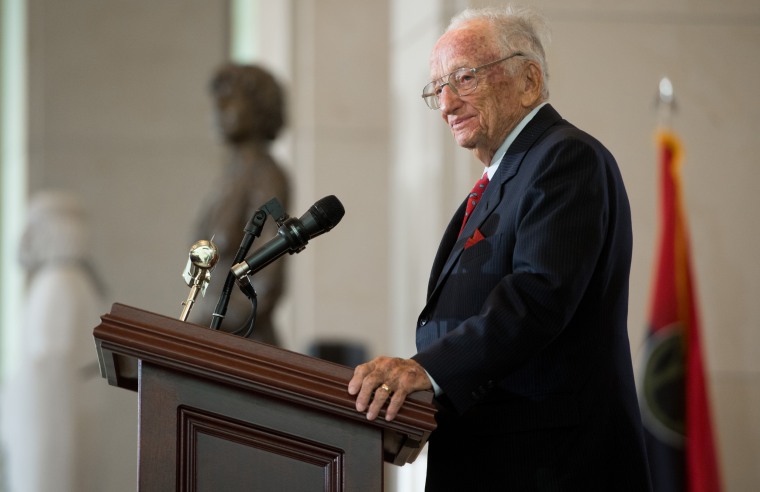
What was described as “the biggest murder trial in history” was in fact Ferencz’s first case ever.
The son of Hungarian Jews, he was 10 months old when his family immigrated to the U.S. in 1920 and settled in New York City. He grew up poor on the rough and tumble streets of Hell’s Kitchen, where his father worked as a janitor-turned-house painter.
Ferencz attended the City College of New York, which was free for bright immigrants, earned a scholarship to Harvard Law School and enlisted in the Army after graduation as World War II engulfed Europe.
He landed on the beaches of Normandy and fought in the Battle of the Bulge. With the allied forces closing in on the center of Nazi power in Berlin, he was transferred to a unit responsible for gathering evidence of war crimes.
Ferencz traveled to multiple concentration camps — Buchenwald, Mauthause, Flossenburg, Ebensee — often within days and sometimes hours of their liberation. The scenes he witnessed would haunt him for the rest of his life.
Skeletal figures with hollow eyes pleading for help — many too weak or too sick to move. Others crawling around garbage piles, digging for scraps of food.
And bodies. So many dead bodies — in some cases stacked like firewood in front of the still-burning crematoriums.
“Grim as hell,” Ferencz said. “I had to refrain from letting it get to me emotionally.”
He had a specific job to do. The Nazis were well known for keeping detailed records. Ferencz was tasked with securing them before they were destroyed.
“My goal was clear: Grab the documents,” he recalled. “I headed straight to the main office and closed it off. ‘Nobody goes in or out without my permission. No German, no American — nobody. I want complete control of the archives,’ which I got.”
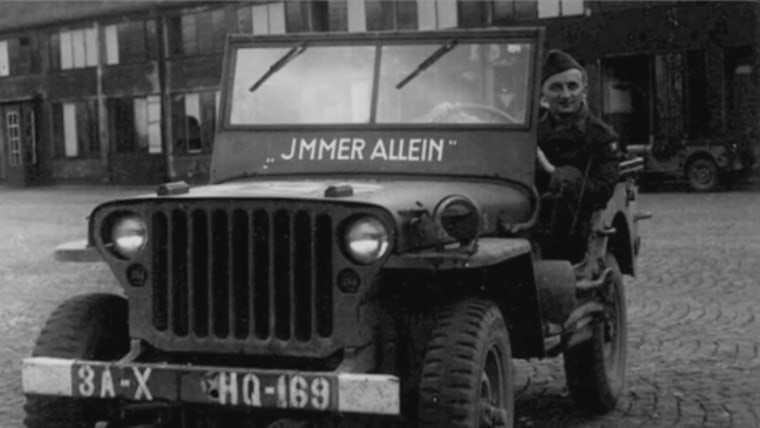
Ferencz said it took immense effort to keep his emotions in check.
“I knew that what I was seeing was horror,” he said.
He told himself: “Just get on with the job, Benny. Just get your evidence. And get your ass out of there.”
Ferencz and his men collected thousands of documents at the camps and facilities in Berlin. They included detailed reports on the Einsatzgruppen, special SS units that roamed Nazi-occupied Europe and killed more than 1 million people.
The Nazis’ studious bookkeeping would soon seal the fate of some of Hitler’s most infamous henchmen.
‘A hot potato’
The first and best-known trial in Nuremberg kicked off in November 1945. It ended with the conviction of Herman Goring and 21 other top Nazi lieutenants.
The U.S. decided to hold 12 more trials in Nuremberg against Nazi judges, doctors and other top figures.
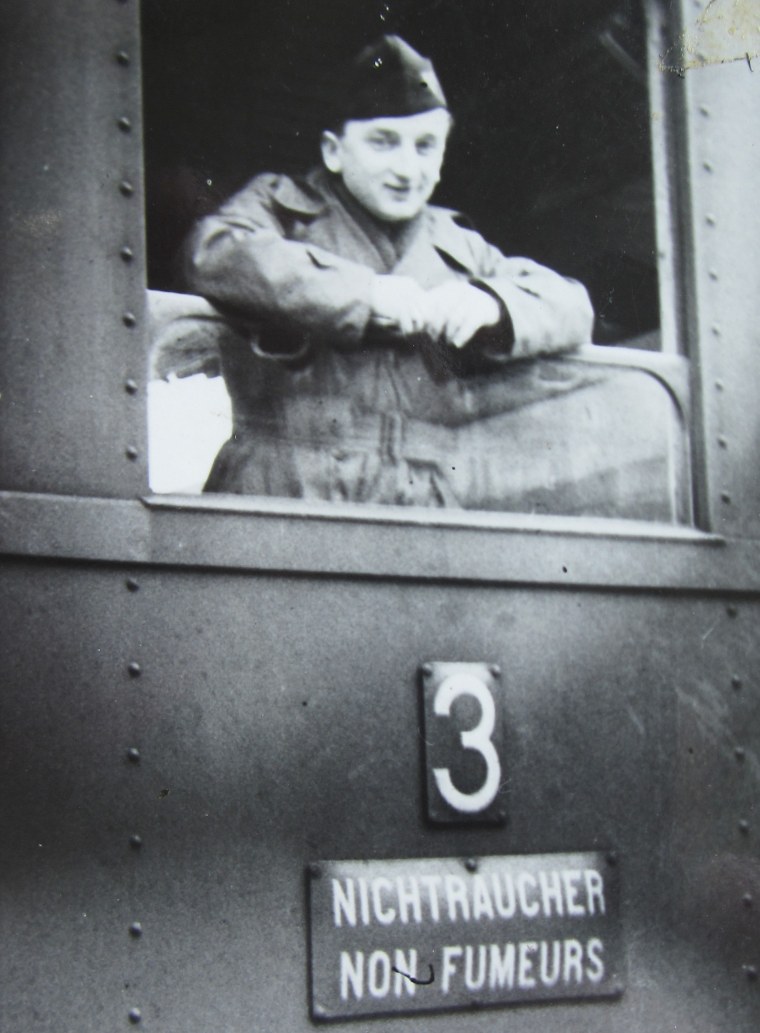
By the time Ferencz found the Einsatzgruppen records, the U.S. had already finalized plans for the other trials.
“I knew I had a hot potato,” he said.
He flew to Nuremberg and told Telford Taylor, the chief counsel for the prosecutions, that they must add another trial. But Telford said it wasn’t possible. The budget had already been set and the Pentagon wasn’t keen on any more trials.
“I got a little bit indignant,” Ferencz recalled. “I said, ‘I have in my hand here the mass murder of a million people. Don’t tell me we can’t put them on trial.’
“He said, ‘Well, can you do it in addition to your other work?’
I said, ‘Sure.’ That’s how I got my first case.”
The trial began on Sept. 29, 1947. The defendants were imposing figures — middle-aged men who had overseen the mass slaughter of innocent civilians. Ferencz was six months shy of his 28th birthday and stood barely 5 feet tall.
He was so short he had to stand on books to reach the courtroom lectern. But he spoke with the power and eloquence of a seasoned litigator.
“The defendants were the cruel executioners whose terror wrote the blackest page in human history,” he said in his opening statement. “Death was their tool and life their toy. If these men be immune, then law has lost its meaning and man must live in fear.”
Ferencz called only one witness — a man who verified the authenticity of the records that documented the “cleansing” of Jews in cities across Europe.
All 22 defendants were convicted, with 14 sentenced to death. But only four were executed, including Otto Ohlendorf, a notorious SS commander.
After the sentencing, Ferencz decided to meet with Ohlendorf in a courtroom holding cell. Not to elicit a confession or probe his mind. Ferencz wanted to extend a favor.
Would Ohlendorf like him to deliver a message to his family?
“I had in mind that he had a wife and five children,” Ferencz said. “Would he like me to say that he was sorry that he brought disgrace on the family or something along those lines?”
But Ohlendorf wasn’t interested. He launched into a diatribe defending the Nazis, saying they were right to resist the “communists” seeking to take over Germany and the rest of the world.
Ferencz cut him off midsentence and ended the conversation with three words uttered in German: “Goodbye, Mr. Ohlendorf.”
“There was no remorse whatsoever,” Ferencz said. “No regrets.”
‘Contagious optimism’
In the years after the trial, he didn’t recede into private life.
Ferencz was recruited to lead an effort to return property seized by the Nazis to its owners or their heirs — a first-of-its kind endeavor that led him to stay in Germany for 10 years. During that period, he was also called in to help negotiate a reparations agreement with the government of West Germany.
It was a fraught and dangerous undertaking. Militant Jewish groups and others angry over the dealings with the Germans resorted to death threats and letter bombs to deter the people involved in the negotiations.
“One thing that people don’t realize is how incredibly dangerous it was for these people,” said Greg Schneider, executive vice president of the Conference on Jewish Material Claims Against Germany, or Claims Conference, an organization created to negotiate the agreements and later handle the dispersal of the money.
“But Ben always spoke about it as if he had no other choice — given what the survivors endured, that it would be unimaginable to him to give up despite whatever dangers he might face.”
The German government ultimately agreed to compensate Holocaust victims around the world.
West German Chancellor Konrad Adenauer was first to sign the deal in Luxembourg in 1952, but his pen had run out of ink so he borrowed one of Ferencz’s — a pen that his wife, Gertrude, whom he had started dating as a teenager, had gifted him when he graduated from law school.
Since the agreement was finalized, roughly $90 billion has been distributed to Holocaust survivors, according to the Claims Conference.
“He is a treasure of humanity,” Schneider said of Ferencz.
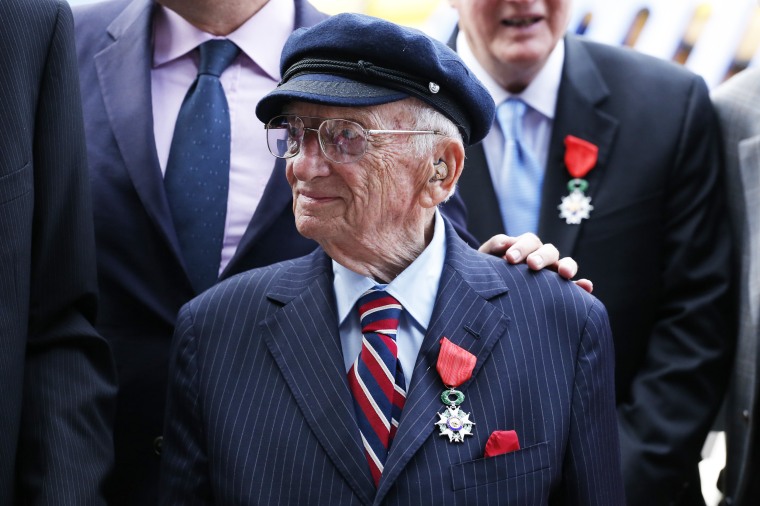
Ferencz was also involved in pushing the Germans to agree to maintain cemeteries where Holocaust victims were buried.
At one meeting, West German officials balked at the suggestion that they should pay for the upkeep of the Jewish burial grounds in perpetuity.
Livid, Ferencz dug his hands into his pockets and pulled out the bones of a child that he had picked up while walking the fields behind the concentration camp in Auschwitz.
“You want them to pay? You ask them,” he recalled telling the officials.
The Germans relented shortly thereafter, according to Ferencz.
“Those bones clinched the argument,” he said in a documentary about him, “Prosecuting Evil.” “Without those bones, it would not have happened, I’m sure.”
Ferencz eventually moved his wife and four children to the U.S. and set up a law practice in New York focused on civil rights and civil liberties. He also lobbied for the creation of the International Criminal Court and was selected, at age 91, to deliver a closing statement in the court’s first case, the prosecution of the Congolese warlord Thomas Lubanga Dyilo.
The former chief prosecutor of the ICC, Fatou Bensouda, has described Ferencz as a founding father of the court and one of her personal heroes.
“In life, there are those who lead by their example; those whose contagious optimism and sense of purpose bring the seemingly impossible within reach,” she said in December 2020 when a bust of Ferencz was unveiled at the court.
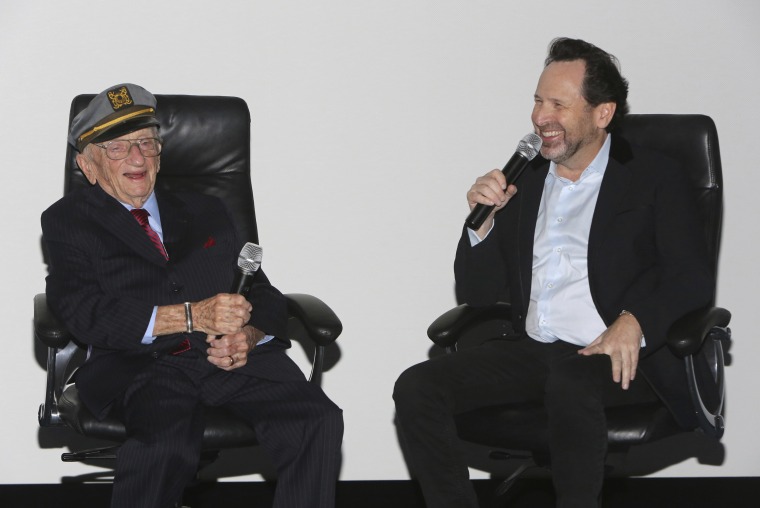
Ferencz had long lamented to his family that, during the 10 years he lived in Germany, no one apologized to him for the Nazi’s actions. But on his 100th birthday, an email landed in his inbox from a descendant of one of the men he had prosecuted.
It was a “very poignant and moving letter of remorse” that expressed “deep thanks and appreciation for my father’s life work,” said Ferencz’s son, Don.
“My father was very moved by it,” he added.
Ferencz replied to the message the next day.
“If everyone thought the way we do it would be a more humane and peaceful world,” he wrote, according to a copy of the email shared with NBC News. “As I prepare to drop the torch I am grateful to you and those like you who will follow my advice to ‘never give up!’”
Over the years, Ferencz has received a boatload of awards and honors. Most recently, he was selected in December to receive the Congressional Gold Medal, Congress’s highest civilian honor.
Ferencz has donated millions to the U.S. Holocaust Memorial Museum and other organizations that promote peace, vowing to end his life the way it started — as a “poor boy.” And he traveled the world into his 90s, spreading his motto of “law, not war.”
“I was damn lucky to live this long,” said Ferencz, who turns 103 in March. “I hope that I’ve done some good during that lifetime.”
